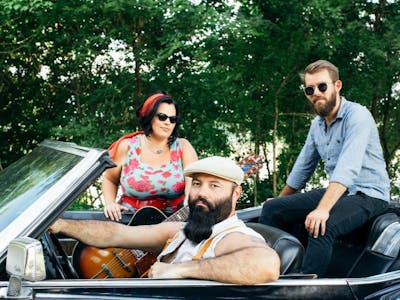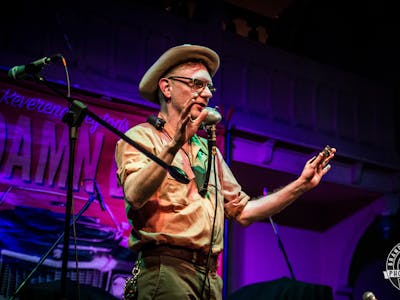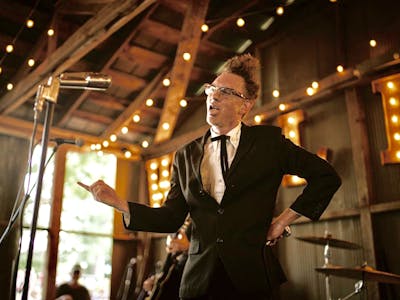It seems that so many shows at the Southgate House Revival have that “Saturday night vs Sunday morning” dichotomy, with stomping rhythms and raucous shouting that walk that fine line with one foot in the juke joint and one foot in the church – fitting for a converted chapel. That same vibe was on display as Brown County, Indiana’s Reverend Peyton’s Big Damn Band and Paducah, Kentucky’s own Colonel J. D. Wilkes brought the final night of their Blues Revolution Tour to SGHR on Saturday night, stomping and shouting their way through a history of hillbilly, blues, and gospel music.
Colonel Wilkes opened the show with his solo act, featuring little more than himself, his harmonica, and a sort of banjo handmade in Spain by a fan out of a cigar box and what appeared to be a hubcap. Wilkes did what he always does, engaging a very large and rambunctious crowd with his deep love of the material and incomparable talent – not just a captivating stage presence, Wilkes is also one of the premier harmonica players in the world, a sentiment echoed later by Reverend Peyton himself. In between songs, he would tell stories – about the greats who had written some of the songs, to the origin of his cigar box banjo, or an introduction for his “horny” harmonica, an antique covered in small brass trumpets. It was like that old show on VH1, but with more bourbon and songs about hoboes (including “Hoboes Are My Heroes,” a personal favorite).
After an extended but too-short set, Wilkes made way for Reverend Peyton’s Big Damn Band to take the stage. For those unfamiliar, the cleverly named “Big Damn Band” consists of the Reverend Peyton on guitars and vocals, “Washboard” Breezy Peyton, fittingly on the washboard and vocals, and drummer (and shouter) Max Senteney. From the opening riff of “Something for Nothing,” the near-capacity crowd was enthralled, stomping in unison with the Reverend’s thumb and bouncing to the rhythm of Breezy’s washboard. Leaning hard on giants of southern blues from Charley Patton to Howlin’ Wolf, Peyton plays his collection of unique and interesting guitars with the sort of fearlessness that only comes from knowing you’re an absolute badass at it.
While Wilkes seemed to relish the opportunity to play storyteller, the Reverend said multiple times during the show he planned to do “more pickin’ and less jawin’” – though he still found time to impart some of his own wisdom to the socially- and economically-diverse Saturday night crowd. R.L. Burnside was quoted with “blues ain’t nothing but dancing music,” and it was also pointed out that, “blues is black country, and hillbilly is white blues” – a point driven home by the both Wilkes’ and the Big Damn Band’s sets, which moved between and blended the two so effortlessly.
After a couple of Charley Patton tunes (which, the Reverend reminded everyone, was a major influence on Robert Johnson and his contemporaries), as well as crowd-pleasers like “Pot Roast and Kisses,” the Big Damn Band invited Colonel Wilkes back onto the stage for what quickly became a masterclass in blowin’ the harp, with the band continually increasing tempo, only to find Wilkes equal to the task, easily keeping up with whatever they threw at him. After a short break, the Big Damn Band returned to the stage for a rousing rendition of “Two Bottles of Wine” which would have been memorable enough on its own for its intensity – and exuberant crowd participation – but made all the more by Breezy walking to the front of the stage and setting her washboard on fire.
When it was over, the show felt as though it had barely just started. As the crowd paid their tabs and filed out of the Sanctuary, they all wore the magnitude of the previous three hours on their faces. It was clear they got what they came for. If you have never seen Wilkes, whether solo or with his Legendary Shack Shakers, or Reverend Peyton’s Big Damn Band live, and you’re a fan of powerful, passionate, “the only electronics here are just to make us louder” good old-fashioned Americana, do yourself a favor and go to their next shows.




